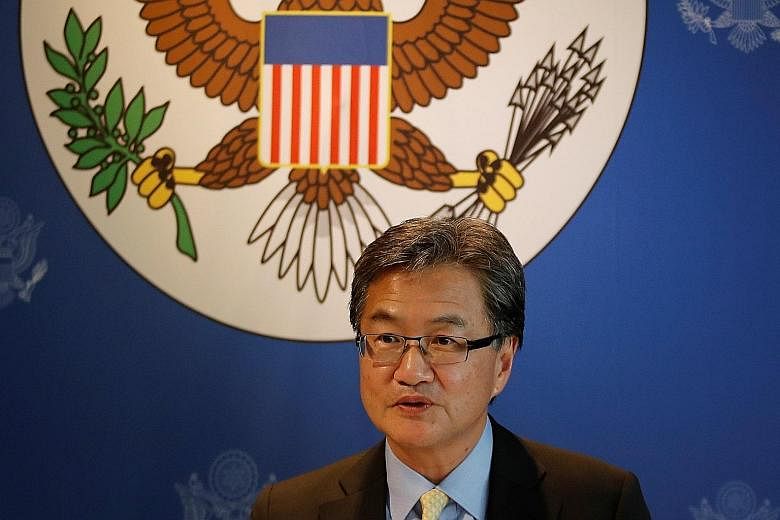Washington should engage in direct diplomacy with Pyongyang alongside sanctions imposed over its nuclear and ballistic missile programmes, said the chief US negotiator for North Korea yesterday.
"We should exercise direct diplomacy as well as sanctions. That is our policy, which is based on pressure and engagement, and we do want to engage in pressure and diplomacy," Mr Joseph Yun, the American special representative on North Korea, told reporters in Bangkok.
He said the United States was open for dialogue with North Korea, but added that the "first credible step" in lowering tensions should come in the form of Pyongyang halting provocations such as launching missiles.
"I hope we get the chance to address the whole question through diplomacy," said Mr Yun, a veteran Asia hand at the State Department.
President Donald Trump has said that all options, including military, are on the table in dealing with North Korea. The isolated state defied United Nations sanctions on Nov 29 to test its most powerful missile yet, which it claimed could strike anywhere in the US.
In response, Ms Nikki Haley, the US ambassador to the UN, said North Korea's regime will be "utterly destroyed" if war breaks out. She also urged the world to cut all ties with Pyongyang.
Mr Yun was in Bangkok as part of a tour of Asia - including Japan - to muster regional support for pressure on North Korea. On Thursday, he had what he called "constructive, open-ended" talks with Thailand's Deputy Foreign Minister Virasakdi Futrakul as well as National Security Council chief Wanlop Rugsanoh.
The US official stressed that his country has no particular concerns about Thailand, which says it has substantially cut trade with North Korea. Thailand was the fourth-largest trade partner, after China, Russia and India.
According to the UN trade database, Thailand exported US$46.8 million (S$63 million) worth of products to North Korea and imported US$3 million worth of goods last year. In August, Thai Foreign Minister Don Pramudwinai said bilateral trade had fallen by 94 per cent over the past year, but did not give further details.
In a statement on Thursday evening, the Thai Foreign Ministry said Mr Virasakdi "reiterated that Thailand has complied with the relevant (UN Security Council) resolutions which imposed sanctions on North Korea".
"Thailand supports the rising call by the international community on North Korea to return to the negotiation process in order to reduce tension and denuclearise the Korean peninsula, which will lead to sustainable peace and security in the region", it said.
General Wanlop was cited by Agence France-Presse (AFP) as saying Thailand had reduced its trade with North Korea to around US$1.5 million a year, and would also curtail visas to North Koreans.
Yesterday, Japan said it had added 19 more entities to its list of organisations and individuals targeted by the asset-freeze sanctions on North Korea. The list comprises 103 entities and 108 individuals, and these are involved in financial services, coal and mineral trading, transportation, and the sending of North Korean labourers abroad.
Japan has already imposed strict sanctions on North Korea, including a blanket ban on trade and port calls, reported AFP.
Meanwhile, in a phone call with Russian President Vladimir Putin, Mr Trump discussed "the situation in several crisis zones, with a focus on solving the nuclear issue on the Korean peninsula", the Kremlin said, without elaborating.
The White House said the two leaders "discussed working together to resolve the very dangerous situation in North Korea".

